Practicing what we preach
By Juan Fereiro Galguera
Full Professor of Law and Religion - University of Coruña - Spain
When speaking of religious freedom, or any fundamental right, we must bear in mind that there are two agents involved. In the first place, the natural or legal persons that are holders of that right and therefore enjoy that freedom and, on the other hand, the state or supra-state institutions, which must guarantee the exercise of this right within the framework protected by the law. The two agents, therefore, have their responsibilities in the sacred task of ensuring that freedom, or as the slogan that brings us together says of "practicing what we preach".
Let us first go to what corresponds to the institutional agents. The recognition, protection and guarantee of religious freedom is a necessary presupposition in any State or international organization that is based on democratic principles and respect for the dignity of people. Therefore, it is an intrinsic presupposition in any democratic country, whether or not it belongs to the European Union, although the member states of the EU should be world leaders in this matter.
Without intending to make an exhaustive analysis of what this idiosyncrasy or institutional way of being requires, a State based on those pillars cannot interact with religious confessions from any discriminatory parameter, that is, by expressing favouritism or prejudice towards religious groups. It is not that they have to apply equal treatment hermetically. Political norms and attitudes may establish differences in treatment, but these differences must be based on a logical, justified and proportionate reason. Otherwise, we would be facing discriminatory treatment.
States that assume the role of the theologian and define what is religious or not, based on the number of followers of a group, or in any other consideration, are missing their duty of religious neutrality and therefore their duty to protect the freedom of beliefs of groups and citizens.
The States of the EU, and the EU as a supranational institution, should reach a consensus, albeit minimal, regarding the limits to the exercise of religious freedom. For that, it would not hurt to have the most liberal countries as their patrons, that is, to have the least restrictive criteria regarding the application of limits to religious freedom.
In principle, it does not seem so complicated. If a group considers itself as a religion and its practices or creed do not harm the fundamental rights of citizens or public order in the sense of order that respects the dignity and freedom of people, the State should recognize it as such and protect the manifestations of their freedom of belief. As we know, that does not always happen. Some States have been undergoing a kind of crusade against religious groups that they label as sects or sectarian offshoots using arguments with little power of legal persuasion. You cannot criminalize a group for alleged illegal activities carried out by one or several members. The only legitimate reason to be able to disqualify a group, no longer as religious, but as a legal entity, would be if it were proven that in an organized and structured way it pursues the achievement of objectives or acts or the use of illicit means.
As regards to religious communities, it is praiseworthy that they fight in favour of the recognition of the exercise of their freedom of belief and against the repression of manifestations of it. However, as active agents of society, they should not be absorbed in legal struggles at the expense of the exercise of their message, that is, prioritizing the legal struggle over the content of their creed, that is, about practicing what they preach. An example of this is given us by the first Christians, who during several centuries in which they lacked religious freedom, among others, could erect a moral building with blood, faith and illusion that has remained in history, resisting even the incongruities of their institutions.
We live in the world in general and in Europe in particular, in times of uncertainty that need messages and moral responses that do not have to coincide with what the majority decides, because truth and beauty shine by themselves. Without wishing to be exhaustive, among the challenges posed to Europe that are on the table we can mention three: dignity, community challenge and equality.
For some years now, rivers of immigrants who have escaped from wars and hunger have come to our borders asking for asylum and refuge. The response of a democratically elected government a few days ago, closing its ports to a ship loaded with drifting human beings, is something that jeopardizes the idea of human dignity.
Rampant individualism in our societies is replacing the ideal of the group as an embodiment of the social nature of man. We are witnessing a devastating phenomenon in our societies. In many areas, the only group reality is families and many of them are broken or self-absorbed. The associative phenomenon, political, social, cultural or religious participation are in crisis.
And finally, recent waves of gender violence or labour and social inequality between men and women question the principle of equality proclaimed in all constitutions.
These are but a few examples of the challenges that we have before us related to the struggle for dignity, solidarity and equality. In short, the struggle for beauty and personal growth. In an environment in which it seems that the only ones legitimised to act are political parties, religious groups have much to say on this plane. Even if it would only be to make true what this wise motto that brings us together prays: "Practicing what we preach".

